Let op: de Academische lezing door Maren Wehrle is verplaatst, de nieuwe datum volgt z.s.m.!
Please note: the Academic lecture by Maren Wehrle has been rescheduled, the new date will follow as soon as possible!
Common People?
On the genesis and critique of lived and represented normality
Maren Wehrle (EUR)
April 29, 3.30-5PM
Hybrid (Nijmegen/Online)
Organized by SWIP-NL and The Center for Contemporary European Philosophy (CCEP) at Radboud University Nijmegen
This is a hybrid event open to researchers, students, and others interested in philosophy
Location: Radboud University Erasmusgebouw, E.2.12, Erasmusplein 1, Nijmegen.
Online via https://hu-berlin.zoom-x.de/j/65275873945?pwd=V1Z4NmxGRENPclc3SnY0VkVZZ00zQT09
For questions, please contact Liesbeth Schoonheim at liesbeth.schoonheim@hu-berlin.de
Abstract:
Normality is actually just another term for taken-for-grantedness. The fact that this longed-for or dreaded normality has come into focus in societal debates in recent years is a sign of the disquiet surrounding this normality. While some yearn for a supposedly lost normality, others see it as a dangerous normation that excludes everything and everyone that does not conform to the norm. But how does that which we experience as normal actually develop or change, and why should this normality be subjected to criticism?
In my talk, I want to demonstrate what a genetic phenomenological investigation of normality can contribute to societal debates as well as to an understanding of individual and intersubjective experience. To this end, I want to introduce the distinction between a lived and represented (discursive) normality, which, I argue, is associated with two different levels of normativity.
The interrelation of lived and represented normality will be examined through example analyses and a focus on embodied experience. The following questions are guiding: What is the phenomenological difference between a necessary and longed-for normality of world and self-experience, and a normation in which prevailing norms and power relations inscribe themselves directly or indirectly into bodies to make experiences like the body ‘normal’? To what extent can normality and the underlying norms be described as enabling on the one hand, and limiting and excluding on the other?
Bio:
Maren Wehrle is Associate Professor in Practical Philosophy at Erasmus School of Philosophy. She obtained a Master degree in Philosophy, German Literature and Historical Anthropology at the University of Freiburg, Germany (2006). In 2011 she received a doctorate in Philosophy from the University of Freiburg with a dissertation entitled ‘Horizonte der Aufmerksamkeit. Entwurf einer dynamischen Konzeption der Aufmerksamkeit aus phänomenologischer und kognitionspsychologischer Sicht‘. From 2012 until 2017 she worked as Post-Doctoral Researcher and Lecturer at the Higher Institute of Philosophy (Center of Phenomenological and Continental Philosophy: Husserl Archives) of KU Leuven, Belgium. Her areas of specializations are Phenomenology, Philosophical and Historical Anthropology, Feminist Philosophy and Cognitive Psychology. Wehrle has authored many articles on topics like embodiment, habit, normality, attention, and normativity. She has written a monograph on Attention in Phenomenology and Cognitive Psychology, ‘Horizonte der Aufmerksamkeit‘ (München: Wilhelm Fink Verlag 2013), and recently an ‘Introduction to the Method of Phenomenology’ (‘Phänomenologie. Eine Einführung’. In Methoden der Philosophie. Springer 2022). Together with other colleagues she edited (with M. Ubiali) the volume ‘Feeling and Value, Willing and Action’ (Phaenomenologica: Springer 2015), a handbook on Edmund Husserl (together with S. Luft), ‘Husserl Handbuch. Leben-Werk-Wirkung’ (Metzler: Stuttgart 2018), and recently the transdisciplinary volume ‘Access and Mediation. Transdisciplinary Perspectives on Attention’ (with Diego D’Angelo and Elizaveta Solomonova).




